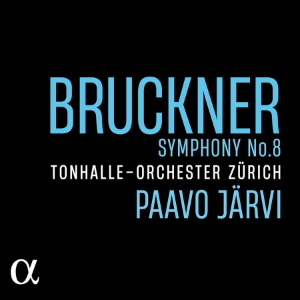
Anton Bruckner (1824-1896)
Symphony No. 8 in C minor WAB 108 (1890 version ed. Nowak)
Tonhalle-Orchester Zürich/Paavo Järvi
rec. 2022, Tonhalle, Zürich
Alpha 987 [82]
Paavo Järvi uses here the conventional 1890 Nowak edition which is now widely accepted as legitimately representing Bruckner’s final thoughts on how the symphony should be presented. As such, this recording is somewhat shorter than those using the Haas Mixed Edition but at 81:36 is a more expansive account than his previous two recordings around a decade ago with the Frankfurt Radio Symphony Orchestra.
I have to say that an initial listening to this left me stumped for anything helpful, useful or perceptive to say about it. It strikes me as a perfectly serviceable rendering with absolutely no distinctive or individual features regarding the playing, direction or engineering. I suppose it could be a good thing that this is “straight” Bruckner and nothing is “messed with”. The problem for me is that almost any good recording of this, my favourite of all symphonies, usually makes me sit up, pay attention and absorb myself in it until its climaxes send a thrill through my innermost being – and this one does virtually nothing for me. The playing is…fine, without any special warmth or frisson. I have recently been involved in some discussion concerning the homogeneity of orchestras and performances worldwide under technically highly competent and interpretatively somewhat soulless conductors who are parachuted in without being allowed much rehearsal time. This is hardly the case with this partnership, as Järvi has been Chief Conductor of the Tonhalle since 2019 and they have made a good few recordings together including Bruckner Seventh Symphony which I reviewed respectfully enough earlier this year while remarking on a certain lack of weight, but there is a blandness to this new account of the Eighth which almost suggests a run-through. Given that this was the first Bruckner symphony performed by this orchestra way back in 1905, one might have hoped for more passion to have been communicated to the listener.
After a competent first movement, the outer sections of the Scherzo strike me as rushed and soulless rather than taut and gripping. The all-important Adagio gives us more of the same; the three harps emerge delicately from the orchestral textures and the strings’ phrasing is flexible and generous, but there is little of the intensity or dynamic contrast I hear in Karajan’s VPO version from 1988 or Sinopoli’s 1994 recording of this same edition with the Staatskapelle Dresden. Nonetheless, this movement presents some of the best of Järvi and the Tonhalle; they give us more of a floating, gauzy textural lightness than the velour opulence of the BPO or the VPO – but the great climax at 21:09 is underwhelming and there is a lack of bite in the violas’ riposte to that peroration before the reprise of the main theme. The coda should be heartbreakingly tender but the movement concludes prosaically. The finale begins promisingly; for the first time there is a whiff of cordite in the air and the timpani sound aptly hard-edged but the march section lapses into a steady plod; indeed, compared with many, Järvi’s timing of just under twenty-five minutes does look slow and it often feels as if the music is losing momentum. Other conductors such as Giulini, Wakasugi and Sinopoli get away with a similar pacing by virtue of maintaining a firmer, more cohesive grip. Matters improve with the brass chorale from fifteen minutes onward and Järvi captures much of the mystery and grandeur of the muttering coda, even if the conclusion is not as powerful as some.
All in all, I find that the inconsistencies and vagaries of this recording render it negligible in comparison with established versions of greater stature.
Ralph Moore
Help us financially by purchasing from





















